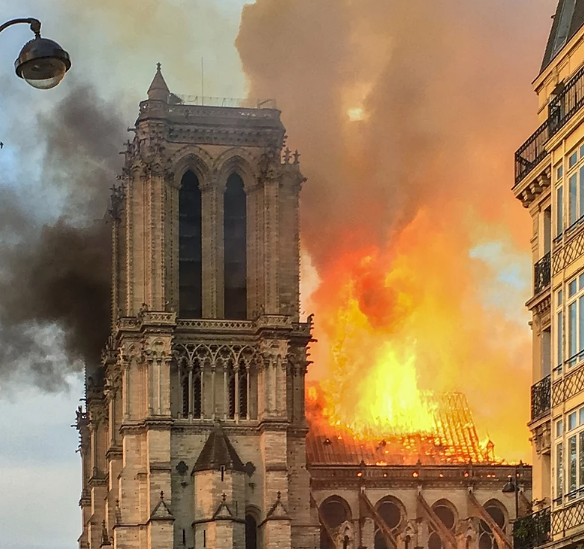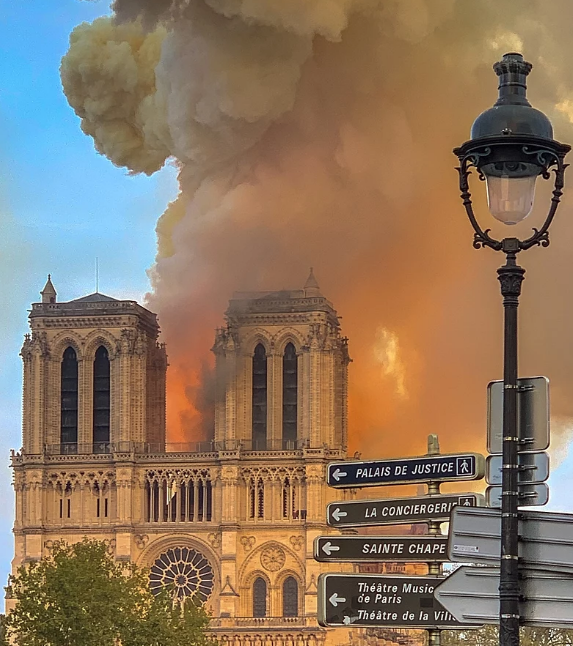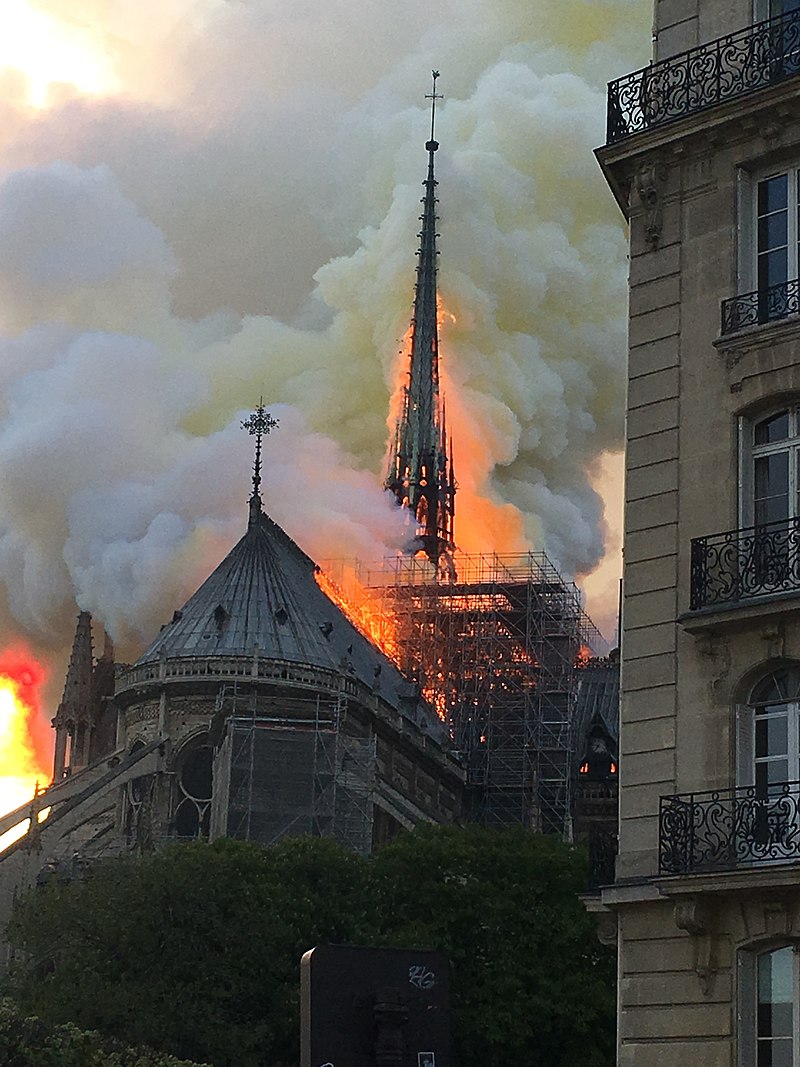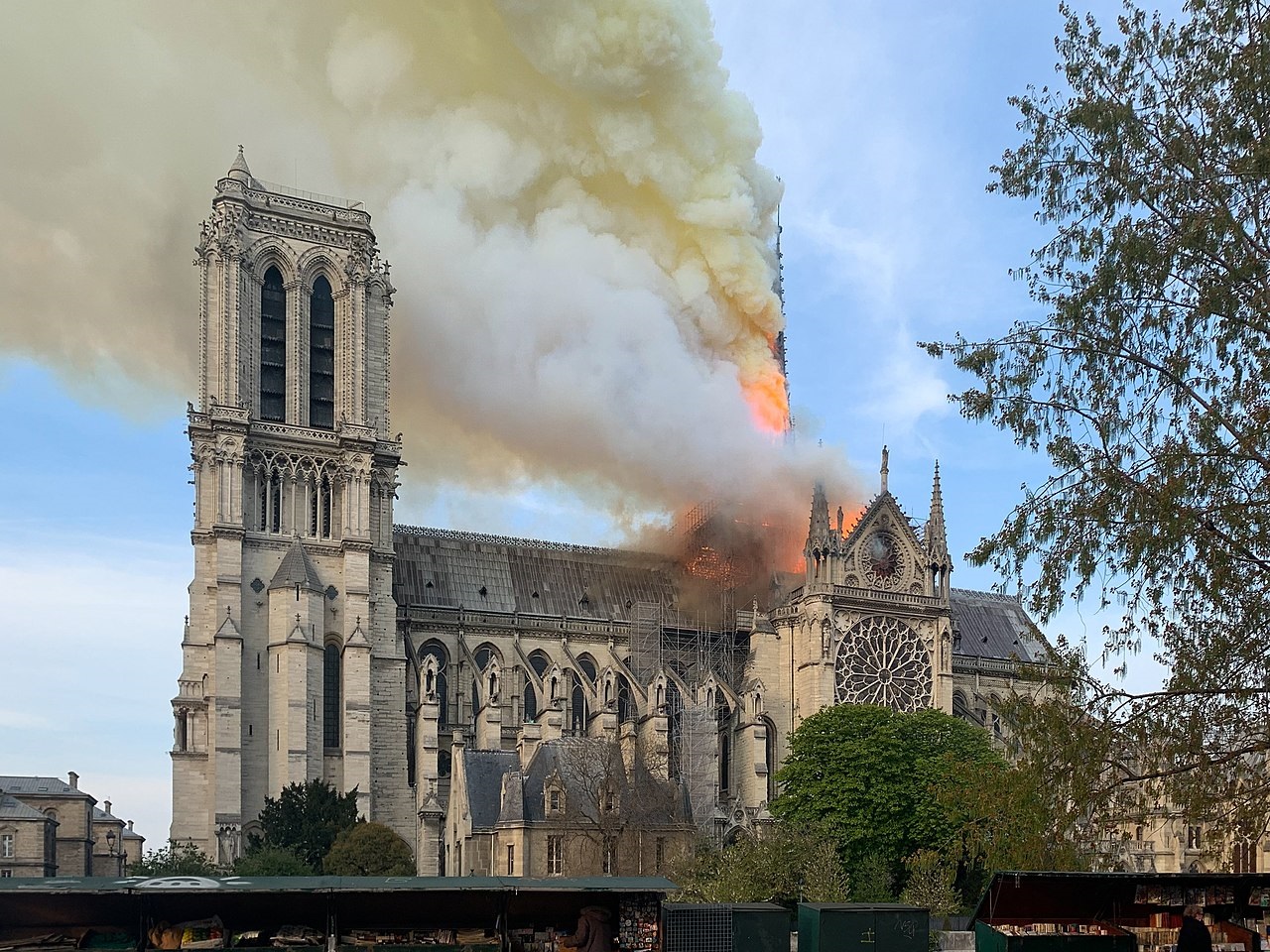The fire that partly destroyed Notre Dame is a tragedy for anyone who cherishes the cultural, artistic and architectural achievements of humanity. Capitalism is undermining its own past achievements and those of previous societies, and this emerges very clearly when one takes a closer look at what happened in Paris on Monday 15 April.
The investigation into the cause of the fire will take some time, possibly months, but it seems its source was connected to the ongoing works on the spire.
It is clear, however, that austerity and the consequent cuts to public spending have played a role.
The cathedral had been in urgent need of restoration for some time. Caroline Bruzelius, an architectural historian at Duke University, nearly 40 years ago had the opportunity to visit parts of Notre Dame that are not usually accessible. In an interview with Foreign Policy she explained that already back then:
“...it was badly in need of restoration in the parts we do not see when we walk in the building, and I’m talking specifically about the enormous wooden structure between the upper parts of the vaults and the roof. That’s old timber. For centuries, it gets heated in the summer and frozen in the winter, and that was incredibly flammable, and that’s why the fire was so horrific and spectacular. It was those old timbers that were burning so ferociously. We saw the fire spread from one section to another in rapid succession.”
The question has to be asked as to why it took nearly 40 years since Bruzelius noted the state of the roof before restoration began? It is clear that years of cuts and neglect in the preservation of heritage sites must be part of the equation.
Austerity also affects our cultural heritage
As we pointed out in a previous 2012 article:
“The effects of the capitalist crisis are being felt at every level of society. As reported in a Time magazine article in April [2012], this also includes the preservation of historical sites. As the cash-strapped European states race to cut public spending and slash budgets, the historical achievements of mankind crumble under paltry allotments for cultural preservation.” (Conserving Culture Under Capitalism, 27 September 2012)
In the context of deepening austerity, there has been a growing tendency to cut funding to the arts, and on cultural spending in general, as part of the general decline of capitalism. In all aspects of life that make for a civilised existence we see massive cuts – from education to healthcare, from housing to the environment – all accompanied by greater and greater privatisation where everything is seen only through the prism of profitability.
The French trade union confederation, CGT, has pointed out in a statement that:
“It is therefore not surprising if today art historians, architects and curators do not hide a certain anger about the lack of resources allocated to the maintenance of monuments and safety standards on heritage construction sites. (...) We do not yet know the causes of the fire but one thing is sure: the constant cutting of human and financial resources can only have detrimental effects on the safety of the monuments, the workers and the visitors. At this rate, it is certain that other such dramas will occur.”
The same statement condemns the “retrograde” policies in the government’s “Action Publique 2022” programme, which states that its aims are, “To improve the quality of public services, provide a modern working environment for workers and promote cuts in public spending.” Of the three aims, it is only the last which is being acted on, which explains the generalised anger against the French government in the recent period.
Hypocrisy of Macron and his super-rich friends
Macron is now exploiting the tragedy of Notre Dame, and the genuine grief expressed by ordinary working people in France and beyond, for his own political needs. He has referred to the fire as an event around which to unite the nation, adding that now is "not a time for politics." And yet what he is doing is politics of the worst kind: exploiting a genuine tragedy, felt as a loss by millions of people, to boost his own popularity. The tragedy of Notre Dame is being used in an attempt to “unite the nation” around this symbol of France and to cut across the radicalisation of the workers and youth.
Whatever he does, however, cannot hide the fact that his popularity has plummeted in the recent period as he has continued on the road of austerity and privatisation. The yellow vests movement has brought out how hated he is. Thus, we have no sympathy for him as he sheds crocodile tears over the destruction of the cathedral.

Our opposition to the attempts of reactionaries to use the tragedy to boost their own agenda does not, however, detract from the real tragedy that the fire represents. Marxists do not rejoice in any way at the destruction of our cultural heritage. Our aim is to preserve all the conquests of the past and build on them in the future.
It is understandable that some react against the hypocrisy surrounding this event. It is understandable if we compare the noise made about Notre Dame, and the immediate offers of big donations from very rich capitalists, to the very slow response to tragedies such as Grenfell Tower in London where 71 people lost their lives. Since that tragedy took place two years ago around £26 million have been raised, but with no significant big donations from famous capitalists, and meanwhile survivors are still in temporary accommodation.
Francosi-Henri Pinault, CEO of Kering, which owns Gucci and Yves Saint Laurent, has donated €100 million towards the restoration of Notre Dame. The Pinault family is estimated to be worth €33 billion. Bernard Arnault, the CEO of LVMH Moët Hennessy Louis Vuitton — said to be the richest man in Europe — has donated €200 million, but his wealth is said to be €80billion. L’Oreal, the French cosmetics company, owned by the Bettancourt family, has donated €200million, while Total, the oil company, has donated €100million. Such donations, although large, are peanuts considering the actual amount of wealth these companies possess.
The huge donations from individual capitalists for Notre Dame serve to highlight how much wealth these people have in their hands, and this has not gone unnoticed in France and beyond. In fact, now we see the beginnings of a backlash against the very billionaires making the donations. “There is growing anger on social media over the inertia of big corporations over social misery while they are showing themselves capable of mobilising a crazy amount of cash overnight for Notre Dame,” stated Ingrid Levavasseur, a founding member of the yellow vests movement.
The immediate offer of hundreds of millions from individual billionaires serves to highlight that it is not true that there is no money for social spending. As of yesterday, the figure donated had reached the €900 million mark, and today reports indicate it has gone over the one billion euro mark, and no doubt will grow further.
What is not highlighted, however, is that French companies can get a 60 percent tax rebate on “cultural donations”. That may explain the eagerness of these billionaire “philanthropists” to rush money to Paris, always keen to find convenient tax loopholes and ways of recycling their money, while at the same time massively advertising their companies.
When it comes to increasing workers’ wages, however, these very same people are very tightfisted. When it comes to increasing spending on healthcare, education and housing, they are equally unwilling to part with their money, and we should use this to bring out the contradictions in the situation.
We should not have to depend on the generosity – or lack thereof – of these wealthy billionaires. Their wealth does not come from the “sweat of their brows”. It comes from the labour of the hundreds of thousands and millions of people who work for them. That wealth should return to the people who created it, the working class as a whole. The way to achieve that is by nationalising the major corporations and using their immense wealth for the good of humanity, which would include the preservation of monuments such as Notre Dame.
Cultural heritage in danger worldwide
It is also our duty, however, to recall that Notre Dame is not the only loss of a major historical monument. We have seen several in the recent period. For example, Brazil’s oldest and most important historical and scientific museum was consumed by fire last year in September, and much of its 20 million items of historical interest were destroyed. It had fallen into disrepair and was a tragedy waiting to happen. Brazil’s then-president, Michel Temer, had presided over cuts to science and education as part of a general programme of austerity. Successive governments are to blame for failing to provide the necessary funding and letting the museum fall into disrepair.
In April 2003, we witnessed the pillaging and looting of the Iraq Museum in Baghdad as US tanks rolled into the city. Almost the whole collection of ancient cylinder seals was stolen, with more than 15,000 precious objects disappearing. (See this article for the details.) Equally tragic was the destruction of the Temple of Baalshamin, and other temples, at one of the best-preserved ruins at the Syrian site of Palmyra, as well as the dynamiting of old Christian and Muslim shrines. In this case, the destruction was carried out by ISIS. Back in 2001, the world's two largest, 1700-year-old, Buddha statues – were blown up by the Taliban in Afghanistan.
When these equally tragic losses of our shared world human culture took place there was, unfortunately, less noise made about them, and not so many billionaires rushed in to make donations.
Notre Dame is a UNESCO world heritage site. There are many others around the world, some of which have been destroyed in wars and civil wars. The civil war in Yemen, in which the Saudi regime has played a key role, has put some of the world’s most treasured Islamic manuscripts at risk. The Saudi regime was given the locations of the important cultural heritage sites in Yemen by UNESCO with the hope of protecting them, but it seems the Saudis have actually been consciously targeting the sites.
One example is what has been done to Sanaa in Yemen. Macron has not shed any tears over Sanaa, as French weapons have been used in the bombing, no doubt producing nice profits for the French armaments industry (see this article: “Investigative website says French arms used in Yemen’s war”). For more details on the immense damage to one of the world’s greatest cultural heritages, see “War savages ancient sites in Yemen and Iraq, destroying archaeological record.” For pictures of the destruction, see “Devastation in Yemen: historic district of Sana'a before and after – in pictures.”
We do not rejoice
All this brings out the sheer hypocrisy of Macron, the French ruling class and the bourgeois media internationally. However, at the same time, it does not permit us to belittle the loss in Paris. The cathedral of Notre Dame is a product of human history, of the labour of many, which is a work of art that stands as testimony to the creativeness of human beings. It is something to be treasured and preserved for all future generations. We are angry, not because it symbolises the Catholic Church or the French state. We are angry because capitalism is failing to preserve what was built by past generations.

Some on the left – albeit a minority fringe – have unfortunately been rejoicing at the burning of Notre Dame. This is infantile to say the least. Some have referred to it as merely a building, others have pointed to the fact that it is a symbol of the Catholic Church, and others have pointed out the nationalist fervour that the ruling class of France has been trying to whip up. Others have tried to use a kind of “anti-colonialism”, seeing in Notre Dame a symbol of French imperialism.
If we were to apply these criteria to judge what has happened, then the logical conclusion would be that we should include in our programme the destruction of all monuments produced by class societies of the past; we should aim to destroy everything that has been created by humanity ever since it rose above the level of primitive savages. That would mean cancelling out everything achieved by the rise of civilisation itself.
We should not forget that humanity rose above its early animal condition by moving from the primitive communism to a class-based society. It was through slavery that humanity began to expand its knowledge and its cultural level. It is true that this came at a great price for those at the bottom, the slaves, but it is what created the material conditions for humanity’s historical leap towards genuine freedom. The great philosophers, mathematicians and writers of ancient Greece contributed enormously to human understanding and knowledge and in so doing began the long and arduous journey to where we are at present.
It was Engels in his masterful work Anti-Duhring, that explained the following:
“It was slavery that first made possible the division of labour between agriculture and industry on a larger scale, and thereby also Hellenism, the flowering of the ancient world. Without slavery, no Greek state, no Greek art and science, without slavery, no Roman Empire. But without the basis laid by Hellenism and the Roman Empire, also no modern Europe. We should never forget that our whole economic, political and intellectual development presupposes a state of things in which slavery was as necessary as it was universally recognised. In this sense we are entitled to say: Without the slavery of antiquity no modern socialism.
“It is very easy to inveigh against slavery and similar things in general terms, and to give vent to high moral indignation at such infamies. Unfortunately all that this conveys is only what everyone knows, namely, that these institutions of antiquity are no longer in accord with our present conditions and our sentiments, which these conditions determine. But it does not tell us one word as to how these institutions arose, why they existed, and what role they played in history. And when we examine these questions, we are compelled to say—however contradictory and heretical it may sound—that the introduction of slavery under the conditions prevailing at that time was a great step forward. For it is a fact that man sprang from the beasts, and had consequently to use barbaric and almost bestial means to extricate himself from barbarism.”
We would invite our readers to study that work if they have not already done so, and in particular read section IV. Theory of Force (Conclusion). From slavery to feudalism to capitalism, human society has risen higher and higher. It has gained greater knowledge, and it has developed technique to unimaginable levels. This has taken thousands of years, more than 10,000 to be precise, but it was an unavoidable and inevitable phase of human development.
Unprecedented crisis of capitalism
The point we now have to highlight is that capitalism has developed the means of production to the level where it is possible to envisage an end to class society. Technique, science, machinery have all reached a level where humans can for the first time in history truly become free. We can begin, for the first time in history, to build a new classless society. The Russian Revolution, had it been followed by successful revolutions in Germany and across Europe as a whole, could have been the beginning of a new society free from class constraints. Its isolation meant that society was eventually pushed back into the swamp of a capitalist system that had ceased to be progressive, and with this came all the barbarism of the 1930s and the Second World War.
We now face an unprecedented crisis of capitalism, which is producing social and political turmoil everywhere. Capitalism had a progressive period when it was massively developing the productive forces and thereby laying down the material conditions for the next leap in human history towards a classless society. Capitalism shed its progressive role long ago and now it plays an utterly reactionary role. From its ascendant period it entered its descent at the outbreak of the First World War, which opened an unprecedented period of class struggle and revolution. Because of the lack of revolutionary leadership, that period ended in reaction and world war.
History, however, has gone full circle and is now presenting us with a new historical opportunity to change society. In changing society, we will not throw out all the accumulated knowledge of humanity achieved through thousands of years of class society. We will take all the achievements of previous societies – the art, the literature, the architecture, the science, the philosophy – produced by the great thinkers of the past and we will make it our own.
The first measures will involve the raising of the general cultural level of society. Up until relatively recently, culture was mainly the preserve of a privileged minority. The great artists, the great musicians and writers, tended to come from within the privileged classes, the bourgeois and petit bourgeois, while the mass of peasants and industrial workers were either illiterate or had access only to very rudimentary education.
Even the great Marxists came from this social background. As Trotsky pointed out in his 1923 text, What Is Proletarian Culture, and Is It Possible?:
“Marx and Engels came out of the ranks of the petty bourgeois democracy and, of course, were brought up on its culture and not on the culture of the proletariat. If there had been no working class, with its strikes, struggles, sufferings and revolts, there would, of course, have been no scientific communism, because there would have been no historical necessity for it. But its theory was formed entirely on the basis of bourgeois culture, both scientific and political, though it declared a fight to the finish upon that culture. Under the pressure of capitalistic contradictions, the universalising thought of the bourgeois democracy, of its boldest, most honest, and most far-sighted representatives, rises to the heights of a marvellous renunciation, armed with all the critical weapons of bourgeois science. Such is the origin of Marxism.”
Note here what he says. Marx and Engels were “armed with all the critical weapons of bourgeois science”. They took the achievements of bourgeois culture and raised it to a higher level, producing that vital tool in the hands of the working class today, Marxist philosophy which allows us to view the world as it really is and prepare for the next phase in the development of humanity.
The task of building a new society
By taking into their hands the means of production and the immense accumulated wealth, which is today held by a small minority of super-rich, the working class will begin the process of building a new society.
 The society of the future will preserve all the achievements of past societies and make them its own. And hopefully the great monuments of the past will still be intact for future generations / Image: Antoninnnnn
The society of the future will preserve all the achievements of past societies and make them its own. And hopefully the great monuments of the past will still be intact for future generations / Image: Antoninnnnn
Will this create a “proletarian culture”? Lenin, in the backward conditions inherited from the old Tsarist regime with widespread illiteracy and a general low cultural level, did not see the immediate task as one of the construction of a new “proletarian culture”. He saw the task as one of helping the masses to first assimilate the essential achievements of bourgeois culture. Once that was achieved, society could move to a higher level. For that to happen, a period of development of industry and agriculture was necessary.
It was Trotsky who posed the question, “Will the proletariat have enough time to create a ‘proletarian’ culture?” Why did Trotsky refer to the amount of time the working class would have to produce its own culture? He was pointing out that socialist revolution has the aim of creating a classless society. In taking power, the working class takes control of all aspects of society, starting with the economy. But in developing the economy further, raising productivity to unimaginable levels, the working class would abolish itself as a class. As he says, “...before the proletariat will have passed out of the stage of cultural apprenticeship, it will have ceased to be a proletariat.” (See What Is Proletarian Culture, and Is It Possible? Leon Trotsky, 1923)
Thus the working class comes to power with the aim not of imposing itself on classes below it – there are none, as all the work is done by the proletariat – but of abolishing all class differences. In so doing it abolishes itself and society as a whole becomes classless. It is in those conditions that we will have genuine freedom and a flourishing of human culture on a level unimaginable to past generations.
The society of the future will preserve all the achievements of past societies and make them its own. It will dedicate immense resources to preserving the culture of thousands of years of human civilisation. And hopefully the great monuments of the past will still be intact for future generations to enjoy many years after class society has been consigned to history.

